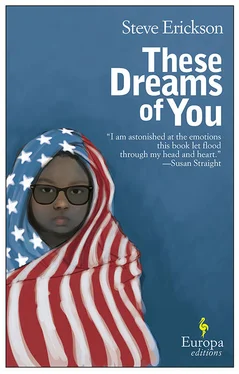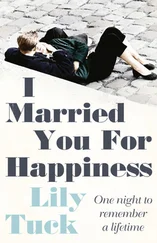The ambassador listens intently. Watching Parker out of the corner of his eye, Zan calibrates his case, trying to say something that won’t alarm his son while still striking a tone of urgency. The ambassador, Zan is impressed to note, seems to grasp the situation and rather expertly registers measured and not undue concern. This is why he’s a diplomat, Zan realizes. “You understand,” the ambassador says sympathetically, “that my country still has its technological challenges, and so therefore sometimes internet service, for instance, can be down for days. And mobile service. . ” He shrugs. “It’s not so unusual for you to not have heard anything.”
“I can’t help worrying,” Zan says.
“Of course not. I will ring up people and make inquiries.”
“Thank you.”
“We will begin with the hotel where Mrs. Nordhoc was staying and go from there. We will talk as well with the birth-family of your daughter. Can you give me their names? Or we have records that I can check, if you don’t have them.”
Zan hands over a list with the names of Sheba’s aunt, grandmother and father. He’s gone back and forth in his mind whether to include the father’s. “The last thing I want,” he says, “or that I know my wife wants, is to cause problems for Sheba’s. . Zema’s father or family. I think Viv is distraught at the prospect that trying to find and help the girl’s birth-mother has created trouble.”
“It was a natural impulse,” the ambassador says.
“It’s just that someday Sheba will want to know. Zema.”
The ambassador laughs. “Sheba.”
“It’s. . just a nickname,” explains Zan.
“Of course. She has a royal presence,” he jokes.
“Very headstrong,” Zan agrees, “a ‘professional,’ she would say.”
“Later on this will serve her well.”
“That’s what we keep telling ourselves. Uh. . also. . ”
“Yes?”
Zan points at the list of names. “We’ve sent some money to her family in Addis when we can manage it financially. Only recently have we realized this could be construed the wrong way. It’s only been to help them out.”
“Of course,” answers the ambassador. “I assure you that no reasonable person could see this as anything but an act of generosity, the same generosity that led you to open up your home to your daughter in the first place.”
“Thank you. I hope so.”
As the ambassador walks the father and son to the door, Zan presents him with a gift. “I hope it doesn’t seem completely vain,” Zan mutters, “it’s. . ”
“Yes!” the ambassador exclaims appreciatively, examining the book. “Mr. Brown told me that you are a novelist of repute.”
“Uh, well, ill repute maybe. I used to be a novelist, fourteen years ago. . ”
“But you have written a novel,” the other man protests, “therefore that makes you a novelist.”
Zan smiles. “That’s what my wife says.”
“I shall let you know what I learn, Mr. Nordhoc.”
“I’m extremely grateful for all your time and trouble.”
“I know that you are worried but I believe it shall be for naught and all will be well. And by the way, congratulations!”
“Oh. . ” Zan thinks he’s referring to the book. “It was fourteen—”
“Yes!” the ambassador exclaims. “For what is happening in your country! Its great new adventure!” but to Zan, the election already is beginning to seem a long time ago.
Across Kensington Road, Sheba and Molly are nowhere to be found in the park. It is, as Molly noted, a big park, so Zan and Parker spend the better part of an hour south of the Serpentine searching everywhere. Zan remembers that the last time he was in this park, almost thirty years ago, an IRA blast killed eight people. “Probably,” Parker suggests to his father, “they went back to the hotel.”
“Yes, I’m sure you’re right,” Zan answers uneasily. The two head east along the edge of the park, crossing Carriage Row. Bloomsbury is a half-hour walk. For all the Tube’s gleaming futurism, Parker still hates places close and dark; but a growing dark seed in Zan trumps the boy’s protests and they catch the Piccadilly line at the Knightsbridge underground. By the time they ascend — as evening falls and their neighborhood comes alive with light and people — and arrive at the hotel, Zan almost persuades himself that the woman and girl will be there.
Zan is overwhelmed by people vanishing. He’s angry at himself for not having bought Molly a cheap, temporary cell phone even though he doesn’t have the money. Everything now tumbles into the realm of scenarios that make no sense; in the clamor of Bloomsbury, he’s having a hard time focusing or thinking clearly. He convinces himself of increasingly unlikely outcomes. When there’s no sign of Sheba and Molly in the hotel lobby, he asks Parker, “Did I give Molly the key?” and sensing in his father a looming panic, the boy doesn’t answer.
Standing in the small hotel room gazing around them, as though within its few square meters the girl and woman could possibly be undetected, with revulsion Zan realizes that he struggles for composure, realizes that in front of his twelve-year-old son he’s on the edge of breaking down from everything, Viv gone, no money, no prospects and now his missing daughter. As the evening passes, Zan waits for a knock at the door as sudden and without warning as the first time Molly appeared and Sheba answered, staring up at her in a silence that for the small girl was as uncommon then as it seems foreboding now.
Zan and Parker have a fight about going out for food. “I’m hungry,” Parker says.
“I’ll run down to the corner,” Zan mutters, “get us some fish and chips.” Parker wants to go to a sushi place a few blocks away, where little dishes circulate the restaurant on a conveyor belt and diners pick out what they want, but the boy realizes this isn’t going to happen tonight. “I want to go with you,” he says instead.
“Stay here. In case—”
“I want to go with you,” the boy insists.
“You need to stay. Someone needs to be here.”
“I want to go!” yells Parker, and Zan realizes the boy is scared too of how at loose ends everything in his young life has come to feel. Zan puts his head in his hands. “Then we’re staying,” he says, immediately ashamed of how petulant it is, punishing his son by making him go hungry. After a while Zan writes a note and sticks it in the door and the two make a mad dash for the grocery store around the corner, buying sandwiches and sodas.
That night Zan barely sleeps. His head explodes; along with everything else, his doctor back in Los Angeles holds hostage, over an unpaid bill, a refill of Zan’s migraine medication, and now he’s down to only a few pills. Parker prowls the internet on Zan’s laptop until finally collapsing into his own restless unconsciousness.
They remain in the room the next morning waiting. Zan calls J. Willkie Brown and gets a voice-mailbox, disconnects without leaving a message, calls back again, leaves a message. Around lunchtime he leaves his cell number with the woman at the hotel’s front desk who asked on the day they checked in if he was Alexander Nordhoc the novelist; and then the father and son walk to the police station at Russell Square ten minutes away. Past a door next to the underground, the police bureau is down a long white hall that might be mistaken for a hospital or asylum.
Taking Zan’s information, the constable’s manner disavows empathy. “But you say,” he asks, trying to get it straight, “that your wife has gone missing as well.”
Читать дальше











